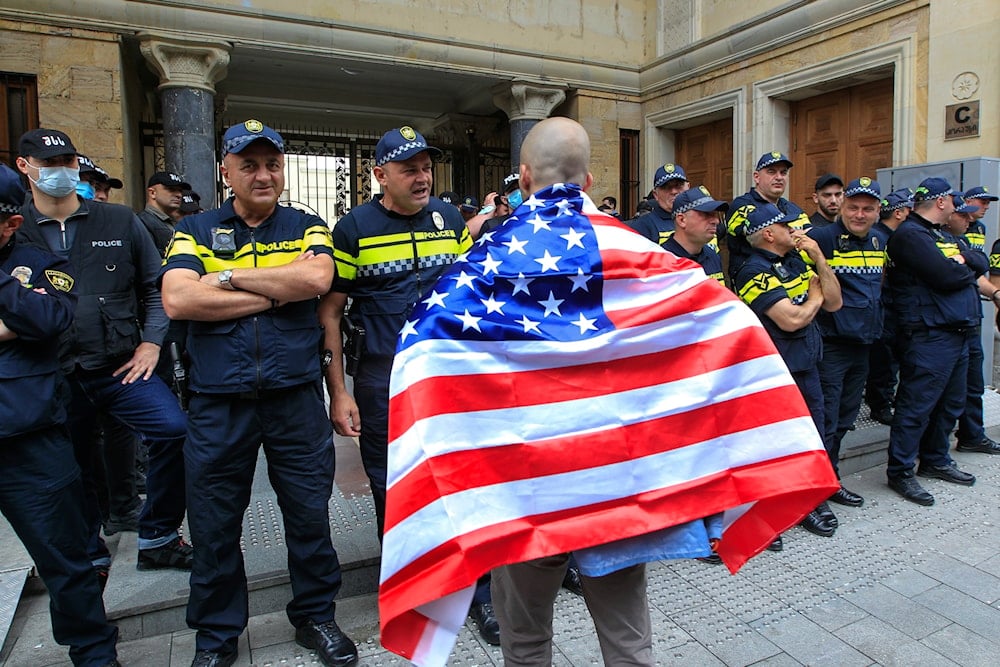US plotting color revolution in Georgia ahead of elections: SVR
According to the Russian Foreign Intelligence Service, the US intends to employ economic and political pressure tactics to oust the governing party.
-

A demonstrator draped in an American flag stands in front of police during an opposition protest against the foreign influence bill at the Parliamentary building in Tbilisi, Georgia, Tuesday, May 28, 2024. (AP)
The United States is trying to orchestrate a color revolution in Georgia ahead of the October elections to prevent the ruling Georgian Dream - Democratic Georgia party from prevailing, the Russian Foreign Intelligence Service (SVR) revealed.
According to the SVR, Washington is "extremely dissatisfied with the landscape in Georgia" and has been plotting to publicly present "evidence of falsification" of votes tallied and monitored by Western-backed non-governmental organization recruits, declare a formal non-recognition of the election results, and request a regime change.
"Washington is providing additional funding for local opposition youth associations, which are expected to become the 'locomotive' of post-election protests," it added.
If the color revolution manifests as a result, law enforcement would be forced to subdue and suppress protests. Meanwhile, the US administration would be preparing "ruthless" economic and political pressure packages in response to the authorities' use of force against what it claims would be "peaceful citizens" protesting the ruling power, the SVR stated.
However, Washington's plot encompasses gaps such as the internally divided US-backed Georgian opposition, weakening the coalitions formed nationally and led by the US, which could backfire in favor of the Georgian Dream party.
The SVR said the opposition could find itself unable to fulfill the West's demands for the nation, a scenario deemed "unacceptable" by the US, forcing it to exert pressure, as well as "a 'tried-and-tested tool': personal sanctions against the top leaders of the [ruling] party, their family members, as well as the party's sponsors."
US may review aid to Georgia if Tbilisi seen as 'adversary'
In May, the Georgian parliament passed a measure on foreign agents, which aims to limit the power of institutions, such as Western NGOs, receiving foreign funds.
The bill calls for compiling a list of people and organizations that receive funding from overseas, which sparked widespread protests and concerns among the opposition, who are concerned that it will allow the government to suppress the work of NGOs and activists in the country.
Thousands of demonstrators took to the streets to protest the bill and gathered at Tbilisi's central Europe Square, chanting: "No to the Russian law!" and "No to the Russian dictatorship!". Georgian and EU flags were also waved during protests.
Consequently, US Assistant Secretary of State for European and Eurasian Affairs James O'Brien said that under a planned foreign agents statute, the United States will be compelled to assess US aid to Georgia if Tbilisi considers Washington an "opponent".
Playing the card of financial aid pressure, O'Brien revealed that the $390 million in assistance the US is planning on spending with Georgian authorities will "be under review if we are now regarded as an adversary and not a partner."
He went on to say that if the measure passes and there is violence against "peaceful protesters", the US will consider placing financial and travel restrictions on those involved.
It is worth noting that the White House expected the Georgian president to veto the law.
Read more: The Georgian Protests: Another Chapter in the Color Revolution Playbook?

 3 Min Read
3 Min Read








